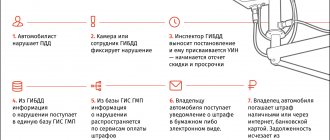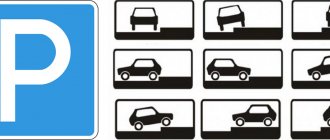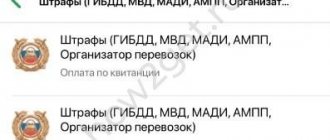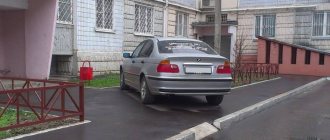Fine for unpaid parking in Moscow
In September 2021, Tatyana Skorykh (last name changed) parked her car on one of the Moscow streets, near her house. There was a paid parking sign nearby, but the woman decided that she had parked the car in the local area and had not paid anything.
The violation was discovered by an inspector checking the parking lot using a special ParkNet complex: the device transmitted data about the violation to the State Public Institution “Administrator of the Moscow Parking Space.”
According to information on the ParkNet website, this is a tablet-based device that can work both manually and automatically (that is, without the participation of a patrol inspector, who is only needed to select a shooting angle).
An employee of the department for registration and recording of violations brought the ambulances to administrative responsibility under clause 2 of Art. 8.14 of the Moscow City Code on Administrative Offenses (“Failure to pay for placing a vehicle in a paid city parking lot”) and fined her 2,500 rubles.
The parking fine was issued in a special manner, without drawing up a report on the administrative violation.
Is there a deadline for sending a fine to the violator?
Undoubtedly! Since violation of stopping/parking rules is an administrative offense, the fine for improper parking in 2021 is imposed by a resolution made according to the rules established by the Code of Administrative Offences.
Thus, according to Article 4.5 of the Administrative Code, a decision in a case of illegal parking must be made no later than 2 months after such a violation was recorded. Accordingly, the traffic police have 2 months after identifying the violator to consider the case, impose a fine and issue a resolution on the administrative case.
Cases of this kind are classified as simple and do not require special consideration; the entire period is not used by police officers - the consideration of the case and the imposition of a fine by the traffic police for an incorrect stop occurs either on this day or the next day after drawing up a protocol on the administrative violation.
According to Article 29.11 of the Administrative Code, the consideration of the case ends with the issuance and announcement of a resolution, which indicates the amount of the fine. A copy of the said decision, within three days from the date of its issuance, is sent by registered mail to the person in respect of whom it was issued - that is, to the violator himself.
The further period, how long it will take for the fine to be sent to the violator, will depend solely on the work of the Russian Post. Again, subject to compliance with all procedural deadlines and by the traffic police officers themselves.
How long does it take for the offender to receive the fine?
Taking into account all that has been said, in an ideal model, a copy of the resolution should be delivered to the address of the parking violation violator within 7-10 days. In practice, this period is usually 2-4 weeks or even more.
As a rule, the reason for such delays is failure to comply with procedural deadlines on the part of police officers. They delay the deadline for sending copies of the decision and send them much later than within three days from the date of issuance.
And this, meanwhile, violates the interests of the offenders themselves. According to Part 1.3. Art. 32.2 of the Administrative Code, a driver who intends to pay a fine for illegal parking within twenty days from the date of the decision has the right to pay it in the amount of 50% of the initially assigned amount. Due to failure to comply with procedural deadlines on the part of the traffic police, a copy of the decision may arrive to the driver much later, which will deprive him of the right to a discount when paying a fine.
Where is the resolution sent?
Documents are sent to the address of the offender’s place of residence, where he is registered, or in accordance with the information about which the traffic police has (Part 2 of Article 25.15 of the Administrative Code).
That is, if the driver’s actual place of residence does not coincide with the data from the police database, with a high degree of probability the driver will not receive a copy of the decision. But this does not mean that the resolution will not gain legal force and a fine for violating parking rules will not be forcibly collected from the driver through the FSSP.
Failure to receive a copy of the resolution in 2021 is not grounds for exemption from liability at all. The fact that the decree was not received by the violator, no matter how much the drivers would like it, definitely plays against them. Even if they do not live at the registration address and have never lived at it.
The fact is that, according to the Review of Practice of the Armed Forces of the Russian Federation, if the recipient of a copy of the resolution is not at the sending address or avoids receiving the resolution, it will be considered to have entered into force from the date of its return to the traffic police indicated on the postal notice.
Accordingly, the violator not only does not know how much the fine for illegal parking is imposed on him, but also:
- will not be able to pay it within 20 days from the date of issue with a 50% discount;
- risks receiving a new fine under Art. 20.25 of the Code of Administrative Offenses in double the amount of the unpaid initial fine, since it is considered that he has evaded punishment.
Woman against a fine for unpaid parking
Skorykh did not agree with the fine and went to court to protect her rights.
In substantiating her position, Skorykh indicated that:
- she parked the car not near 3/9 on the 3rd passage of Maryina Roshcha, as ParkNet indicated, but near the neighboring high-rise building at number 5;
- her car was not parked where the “Parking” and “Paid Services” signs were installed, but on the opposite side, where the parking space was not marked and not equipped, that is, in fact, she left the car in the local area.
When do you receive a fine for paid parking?
Erroneous parking fines are associated both with technical nuances and due to a misunderstanding of the driver himself. Therefore, the first thing you need to do is find out why you received a penalty after paying for a parking space. Let's name the key ones:
- The parking space has changed. If you park in one spot in a parking zone but later move to another, your likelihood of getting a ticket increases. The reason is trivial: it is difficult to visually distinguish the boundaries of the parking lot, so the driver relies on intuition, but the system in this case acts strictly according to the algorithm and accepts the movement of the car as a newly arrived vehicle.
- Error when paying for parking. There may be two options: a system failure or incorrect entry of the vehicle license plate number. In both cases, if payment for parking is successful (even without issuing a receipt when the system is frozen), the law is on the side of the car owner. You can safely appeal an administrative penalty (detailed instructions will be below).
- Paying for parking late when the statutory deadlines for repaying the debt have expired. If you are late with your payment due to a technical failure (for example, the funds did not arrive in the addressee’s account for a long time), you will not have to pay a second parking fine. On the contrary, if the fine is not paid on time due to the fault of the driver, the administrative penalty remains in force.
If you have received a notice of a fine, but the required amount for parking has already been paid, you should not ignore such a message. It is necessary to contact the traffic police as soon as possible with a complaint and explain the situation, since inaction will lead to even more penalties.
The court's position: ParkNet is not mistaken
The Ostankino District Court of Moscow considered that, according to the rules for the use of city parking lots and the placement of vehicles there, approved by Moscow Government Resolution No. 289-PP, the entire section of the road network belongs to the city parking area. Accordingly, it does not matter which side the car was parked on as long as it was within the paid parking area.
The court also drew up a logical chain, analyzing the operating principle of the ParkNet complex:
- the product was in good working order, as there is an inspection certificate;
- a working tool detects only cars that fall under the influence of either a sign or markings, that is, cars of violators;
- There is no reason not to trust the data from the ParkNet complex.
The District Court, like the Moscow City Court, agreed with the position of the court of first instance and confirmed the guilt of the ambulances in non-payment of parking. The deputy chairman of the Moscow City Court also supported their position.
Paid parking rules
In accordance with the uniform rules of the data center, a citizen is required to pay for stopping a vehicle in a designated area within the first 15 minutes. If this does not happen, parking employees can record the violation and transfer the data to traffic police inspectors for drawing up an administrative protocol.
At the same time, according to the current legislation of the Russian Federation, employees of operational services (police, ambulance, firefighters, etc.) and residents, whose roles are:
- Owners of residential and commercial premises located in the parking area;
- People living in apartments or renting offices attached to paid parking lots (if there is a social tenancy agreement);
- Citizens renting housing under a general power of attorney for a period of more than 1 year (including persons with temporary registration).
The presence of an appropriate sign under the “paid parking” sign also makes the above-mentioned privileges available to the disabled, war veterans and breadwinners of large families. All other drivers are required to complete the transaction to purchase a parking space using one of two available methods.
Position of the Supreme Court: abolish parking fines
The woman turned out to be persistent and complained to the Supreme Court, which took the following position:
- in this situation, it was possible to do without a protocol on an administrative offense only if the violation was recorded by a special automatic device (Part 3 of Article 28.6 of the Administrative Code “Imposition of administrative punishment without drawing up a protocol”);
- the lower courts did not examine how the ParkNet complex works - automatically or with the help of an operator.
In 2021, the case was returned by the Supreme Court for a new trial (No. 5-AD 20-113).
Normative base
The key document for drivers, which regulates the rules for using parking and establishes types of punishment for violating them, is the Code of Administrative Offenses of the Russian Federation or the Code of Administrative Offenses of the Russian Federation in abbreviated form. The following articles of this document regulate the situation:
Attention! If you have any questions, you can chat for free with a lawyer at the bottom of the screen or call Moscow; Saint Petersburg; Free call for all of Russia.
- Art. 32.2 part 1.3 (in which cases the driver has the right to pay only half of the total amount of the collection);
- Art. 30.4 part 1 (terms for appealing fine decisions).
Both traffic police officers and representatives of other authorized departments have the right to prescribe fines for parking violations. Thus, in the city of Moscow, the state agency AMPP is responsible for issuing resolutions on unpaid parking. Fines for violating parking rules (for example, stopping under a prohibiting sign, etc.) are issued by employees of MADI - the Moscow Road Inspectorate.
Review of the case: parking fine canceled
The Ostankino District Court, re-examining the case, turned to the resolution of the Plenum of the Supreme Court No. 20 of June 25, 2021.
It says that automatic mode is when the device is not influenced by a person in any way and it records all violations that fall into its lens, for example, when installed on a vehicle.
Since the case materials do not contain confirmation that the ParkNet agro-industrial complex operated without the participation of an operator, the court dismissed the proceedings for lack of proof of the circumstances.
Progress in court
After submitting an application to the court, the car owner will be given a date and time for consideration of his case. You must arrive at the court hearing without delay and with a complete set of documents to appeal the parking fine. During the consideration of the case, you will need to tell the essence of your complaint and provide all the evidence. You can also object to any statements of your opponents, petition for the involvement of witnesses and the inclusion of documents.
Typically, trials in such cases proceed quickly and the judge quickly makes a decision. It could be as follows:
- complete removal of the fine;
- partial change of punishment;
- dismissal of the complaint;
- postponement of consideration due to any circumstances.
After the decision is announced, you need to obtain a copy of it from the court office. If you do not agree with the judge's verdict, you can challenge the parking fine in a higher authority. The judge who made the decision is obliged to notify you of the possibility and procedure for appealing it.
When is it possible to cancel a parking fine?
The mode of operation of the fixing complex (manual or automatic) is of decisive importance in similar cases.
The Plenum of the Supreme Court, in Resolution No. 20 of June 25, 2021, clarified the concept of “automatic complex” and explained what to do if the filming was carried out using a telephone, video camera or video recorder: in this case, the standard procedure for bringing to justice applies. A “letter of happiness” cannot come automatically.
Established judicial practice has established that ParkNet is not a special technical device, since it does not make measurements, but performs the functions of a photographic means.
Step-by-step instructions for appealing
So, what steps should you take if you receive an envelope containing a receipt for a parking ticket in 2021 and want to challenge the decision?
- Carefully study the parking fine receipt and find out which organization imposed the penalty on you - the traffic police, MADI or AMPP. This can be done using the codes described above.
- Collect documents that prove your innocence: photographs of the absence of signs or markings indicating a paid parking zone, as well as the absence or poor visibility of road signs prohibiting parking, photographic evidence that your car was in a completely different place at the time of the offense, payment receipts parking time - it all depends on what you were fined for.
- Write the text of the complaint, describing your situation and evidence of your innocence in as much detail as possible. The correct filing of an appeal against a parking fine in 2021 will be discussed in detail below.
- Send the complaint with the attached package of documents to the authority that issued the fine or to the court at the place where the offense was committed. This can be done in person, by mail or online.
- Be sure to make sure that your complaint is accepted, recorded in the journal of incoming documents and its registration number is dictated to you.
Payment period
The deadline for paying penalties is established by Part 1 of Article 32.2 of the Code of Administrative Offenses of the Russian Federation and is 60 days from the date of entry into force of the decision on the citizen’s offense.
It is also important that these 60 days will begin only after the 10-day period that is given to appeal the decision (we talked about whether it is possible to challenge a parking fine and how to do it correctly in this article). It turns out that the law provides 70 days to pay the debt .
The time frame has become longer, as the size of fines has increased and not everyone can collect the entire amount in a short time.
Are repayment deferments possible?
If payment is not made within the time limit established by the Code of Administrative Violations, the case is sent to court for further proceedings and collection of debt from the violator. And after the court makes a decision, the bailiffs are directly involved in collecting funds from the guilty person.
Within 10 days, you can appeal and ask for an installment plan or deferred payment from the service that issued the parking fine.
According to Article 31.9 Part 2 of the Code of Administrative Offenses of Russia: the period for collecting finances for an administrative violation is extended if the person who was brought to administrative responsibility was found to be evading payment, and law enforcement services discovered income or things that could penalties will apply, according to the resolution.
In other words, even despite the existing statute of limitations, you will not be able to simply “forget” to pay it . Bailiffs will meticulously take all possible actions to collect the debt and bring the offender to justice in the form of:
- 50 hours of compulsory work;
- 15 days of administrative arrest;
- Ban on traveling abroad until all debt is repaid;
Parking fines have increased noticeably lately, so it’s better to pay it right away. Delaying payment can lead to unpleasant proceedings with bailiffs , and this is also unprofitable for the violator. Let us remind you that everyone can take advantage of the installment plan or deferment of the fine by contacting the relevant organization with an application.
If you find an error, please select a piece of text and press Ctrl+Enter.
Fine delivery time
It is impossible not to notice an obvious trend: the number of vehicles is steadily growing, the number of parking spaces is steadily decreasing. In large cities, their shortage is catastrophically noticeable, and therefore the fight against violators of stopping and parking rules has reached the municipal level. If you parked in the wrong place, you screwed up, and you already have a fine for illegal parking. But the driver does not find out about this immediately, but only when he receives by mail a copy of the resolution of the traffic police or another authorized body (for example, in Moscow these are MADI and AMPP). How many days do fines for unpaid or prohibited stops and parking arrive and how can I find out about them in advance?
How long does it take for traffic police fines to expire?
So, if you do not pay traffic police fines, they will expire - the data is current as of January 3, 2021. This happens 2 years after the date of entry into force of the decision on such a fine. Article 31.9 of the Code of Administrative Offenses tells us this:
Article 31.9. The limitation period for the execution of a decision to impose an administrative penalty.
1. A resolution on the imposition of an administrative penalty is not subject to execution if this resolution has not been enforced within two years from the date of its entry into legal force.
As you can see, everything is simple! Execution of a punishment is the payment of a fine, and if the fine has not been executed within two years from the date it came into force, it expires.
But what is the effective date? According to the same Code of Administrative Offenses (Article 31.1), this is the date on which the period for appealing the decision on a fine expires. That is, first the inspector makes a decision (namely a decision, not a protocol), then there is a period during which this decision can be appealed, and after this period the decision comes into force, and it can no longer be appealed. The appeal period for almost all traffic fines is 10 days. But this period is interrupted if you appeal the decision.
If the decision was made not by the inspector, but by means of automatic recording, then the period for appeal begins after the driver has been properly notified of the punishment. Such notification is a registered letter with a copy of the resolution received by the driver at his place of registration if he did not evade receiving it.
Example: citizen Ivanov committed a violation on June 3, 2021 - he was driving at an excessive speed, which was recorded by an auto-recording camera. As a result, a resolution was drawn up against him, issued on June 5 of the same year, and a copy of the resolution was sent to Ivanov by mail. Ivanov received this copy on June 14, 2021, and did not appeal this fine.
As a result, we get the following timing:
- The date of entry into force of the resolution is June 24, 2016 (date of receipt of the copy + 10 days for appeal).
- The date when the fine expires is June 24, 2018.
It seems like nothing complicated, doesn’t it?! But in reality, fines are burned in this way very rarely. The fact is that the state takes good care of replenishing the budget, so it will not allow you to simply not pay a fine - this will be discussed below.










